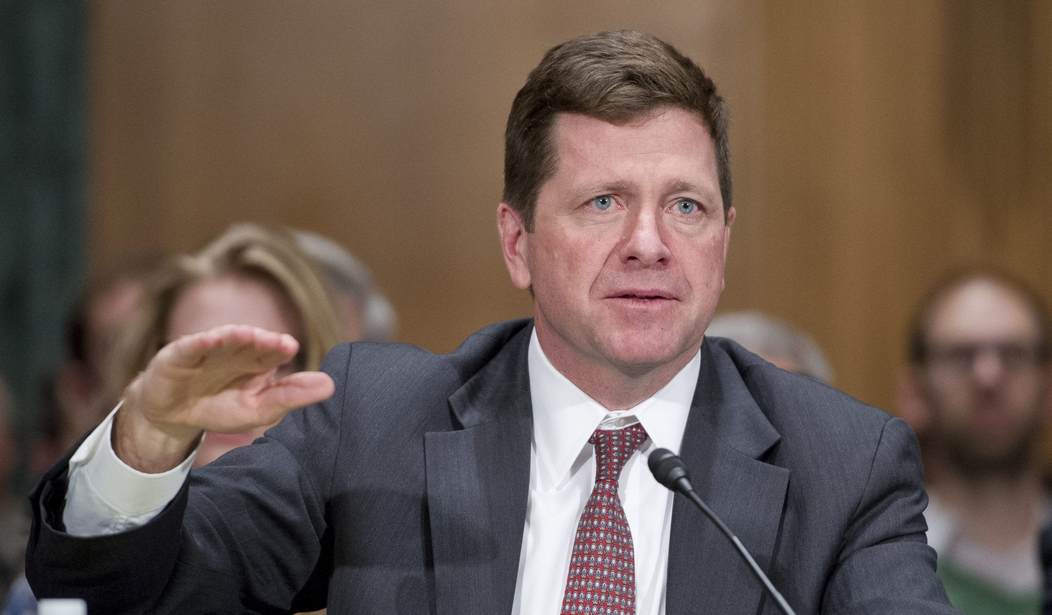WASHINGTON — SEC Chairman Jay Clayton last week urged virtual currency investors to use “common sense,” as there is very little that American regulators can do to recover stolen investments abroad.
“We recognize that many investment decisions will prove to be incorrect in hindsight,” Clayton told the Senate Banking Committee on Tuesday.
He explained that virtual currency exchanges may see funds quickly travel overseas without the investors’ knowledge.
“As a result, risks can be amplified, including the risk that U.S. market regulators, such as the SEC and state securities regulators, may not be able to effectively pursue bad actors or recover funds,” he said.
According to testimony, more than 10 percent of proceeds generated by initial coin offerings – or about $400 million – has been lost to digital attacks. Last month, a Japanese cryptocurrency market lost more than $500 million in an apparent hack. More than 3 million Bitcoins have been stolen, which amounts to about 14 percent. One third of Bitcoin exchanges were cyber-hacked between 2009 and 2015.
Clayton, Commodity Futures Trading Commission Chairman J. Christopher Giancarlo and lawmakers discussed the rapid rise in popularity for virtual currencies across the globe.
According to testimony, Bitcoin was trading at $1,000 per unit in January 2017 and peaked nearly a year later at $20,000. This week, Bitcoin was trading at about $6,900, and the currency’s market capitalization now stands at roughly $115 billion. When subcommittee hearings on the topic were held in 2013, the total value of Bitcoin in circulation was about $5 billion. On a given day, the total valuation can swing by tens of billions of dollars.
“I don’t think anyone imagined how quickly and broadly Bitcoin and the technology which it’s based on would spread,” Ranking Member Sherrod Brown (D-Ohio) said at the hearing.
Giancarlo noted that Bitcoin’s market capitalization is less than the stock market capitalization of a single large cap business like McDonald’s, which amounts to about $130 billion. And though Bitcoin is often compared to gold as an investment vehicle, the total value of gold is estimated to be about $8 trillion by the World Gold Council.
Even so, Giancarlo said that these “emerging financial technologies broadly are taking us into a new chapter of economic history.”
“They are impacting trading, markets and the entire financial landscape with far-ranging implications for capital formation and risk transfer,” he said.
Brown continued that it seems that hackers understand more about the technology than market participants, and he asked the regulators what can be done to better inform potential investors.
Clayton urged investors to review the sample questions and investor alerts issued by the SEC’s Office of Investor Education and Advocacy. The regulator also has issued investor bulletins on initial coin offerings and an investigative report on what characteristics make an ICO a security offering. Additionally, SEC has issued joint statements with the CFTC about enforcement of virtual currency-related products.
“Much of the recent news about virtual currencies has been negative,” Chairman Mike Crapo (R-Idaho) said in his opening remarks, noting enforcement action and high-profile hacks. “It is also important to note that the technology, innovation and ideas underlying these markets present significant positive potential.”
Virtual currencies, he continued, have the ability to change and modernize capital formation and transfer of risk. As Clayton noted, virtual currencies may allow the SEC to better monitor transactions, holdings and obligations, as well as other activities and characteristics of markets.
Clayton was asked what drives the volatility of virtual currencies like Bitcoin.
“I don’t really know,” he said. “They’re not correlated with sovereign currencies, so it must be something different than what would drive the dollar, but that’s one of the issues before us.”
The regulators were also asked to explain what enforcement options are available for pursuing action against foreign countries using virtual currencies to evade U.S. sanctions. Venezuela has been reportedly using petro, an oil-backed cryptocurrency, and Russia has been using the CryptoRuble.
“Our jurisdiction would be very limited in that area, senator,” Giancarlo said, though he noted that regulators have enforcement authority for fraud and manipulation.
Clayton also made it a point to inform celebrities that they will be responsible for promoting risky virtual currencies. Floyd Mayweather and Kim Kardashian have been involved in promotional ads on social media for fledgling virtual currency companies.
“If you are promoting securities, you’re potentially taking on securities law liability,” Clayton said, repeating an alert the SEC issued previously.









Join the conversation as a VIP Member